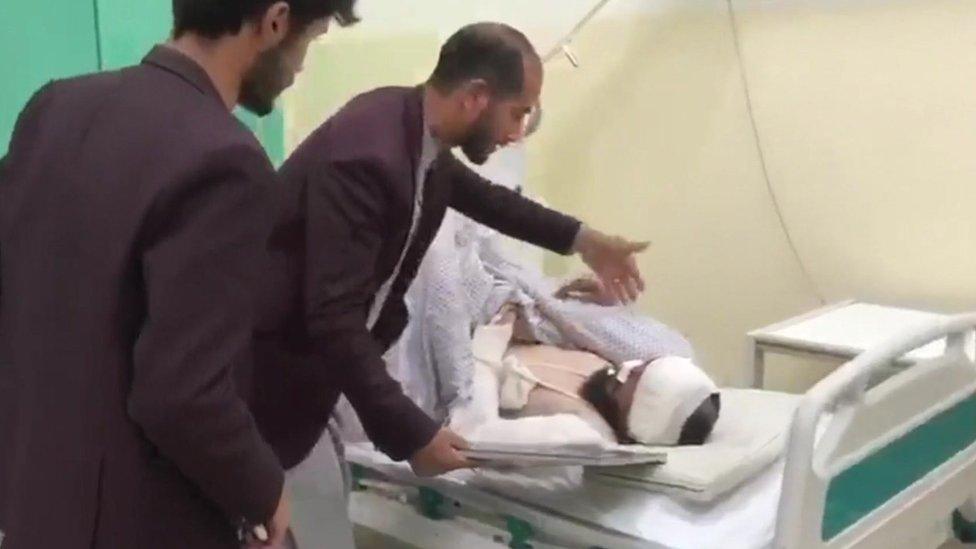Surviving a week in Afghanistan
- Published
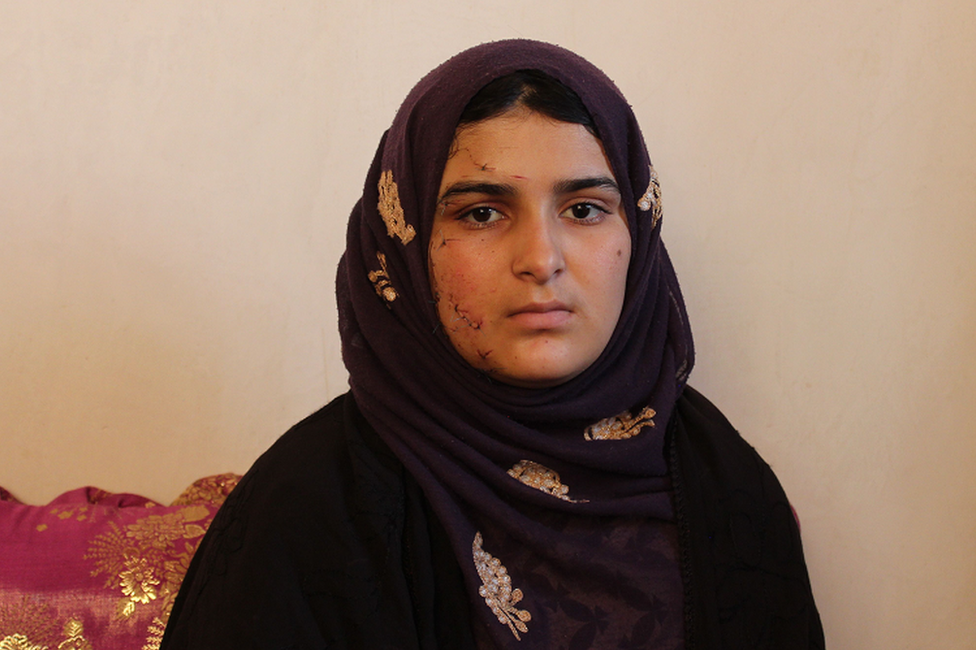
Razia survived a car bomb detonated next to her sign language school
It took Hussain Haidari three hours, and by the time he found his wife's cousin, Latif Sarwari, he had seen too many lifeless faces.
Latif was 20 years old and in the 12th grade of high school. He'd dreamed of being a doctor. Like many of his classmates, he had moved to Kabul three months ago to prepare for the university entrance exams.
On Saturday afternoon, Latif left the Kawsar-e Danish tutoring centre in the city after his usual daily four-hour class, and died moments later in a suicide bombing that killed 25 people and filled the street with dust and smoke.
There was no way to reach Latif's parents by phone, so Hussain prepared himself to travel in person to their remote village in Ghazni province, many miles to the south.
"We are going to take Latif's body back to the village which he left to pursue his dreams," he said. "How can we face his mother and father with the dead body of their son?"
On Monday, family members broke the news in person.
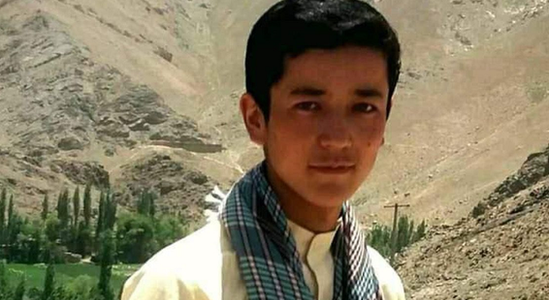
Latif Sarwari, whose dream was to become a doctor
Last week in Afghanistan there was at least one atrocity every single day. Latif's parents were just two of the many family members left bereaved by the violence, which despite ongoing peace talks seems only to be intensifying.
The BBC looked back at one week in Afghanistan, at those who died and those who survived.
Sunday 18 October
Razia, her sister Marzia and her brother Nayeb are congenitally deaf. They go to a special sign language school in Ghor province and all sign to communicate. The three siblings had just started daily class on Sunday 18 October and were in their world of silence when a truck full of explosives detonated directly outside the building.
"It was the first time in my entire life I had heard anything," said Razia, who is 16. "It was harrowing. My ears are deaf and unfamiliar with any sound but I heard a powerful noise in one ear."
At least 16 people were killed, and more than 150 wounded. The explosion destroyed the school and surrounding buildings. Razia and her siblings were in class along with 19 other students.
"For a few moments I thought I was dead," she said. "My sister was moving but I thought my brother was also dead. Luckily both are alive."
Marzia, 18, heard the explosion too, she said. "It was the first time I have heard anything. It was a loud, horrific sound that jolted my heart."
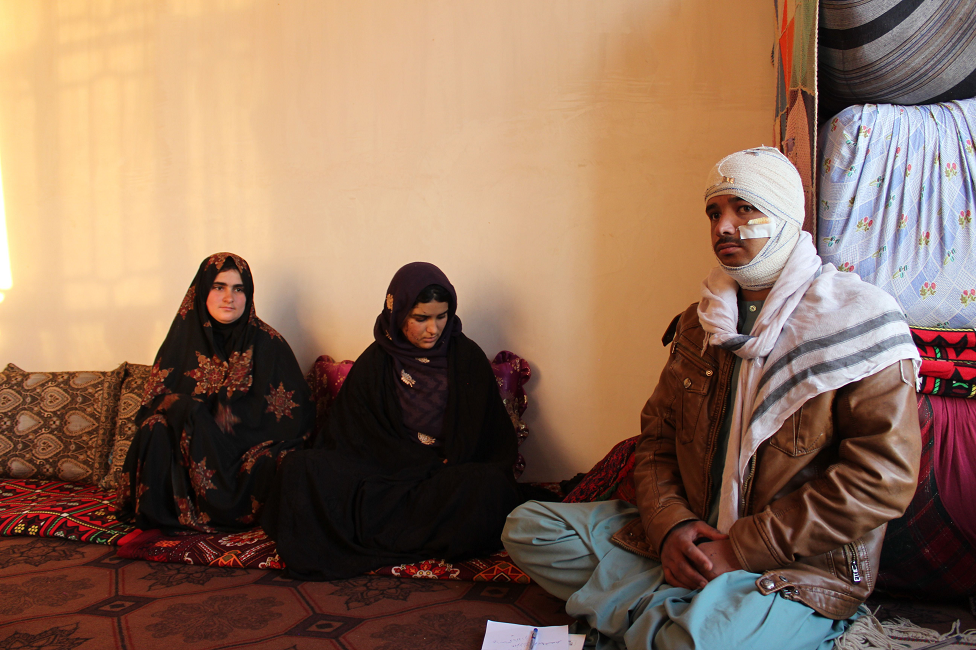
Marzia, 18, Razia, 16, and Nayeb, 22, at home in Ghor province
A week after the attack, Marzia still wakes up from her nightmares and goes to her widowed mother for comfort. She is afraid to leave the house.
The three siblings are among the lucky ones who survived. Most of the victims of the bomb were workers, and some families are mourning the loss of their only breadwinners. Amid their grief, they face destitution.
Monday 19 October
In Khost, a motorbike carrying explosives detonated near a wedding ceremony, killing at least four people and wounding 10 others.
In Uruzgan province, two policemen were killed in a Taliban attack and four others were wounded.
Tuesday 20 October
At least five soldiers were killed and two wounded when a roadside mine was detonated next to a convoy in Nimruz province. The district police chief was among the dead.
His young son Benyamin appeared on local TV to say he would take revenge on the Taliban when he grew up. "I am saying this so Ashraf Ghani listens to my pain," he said, addressing the president.
"My dad died for Ashraf Ghani and he needs to hear my sorrow."
Is peace with the Taliban possible?
Later that day, two hours from Kabul in Wardak province, a roadside bomb destroyed several civilian vehicles, killing at least 11 people.
Wednesday 21 October
In the early hours of Wednesday morning, the Taliban attacked a security base and killed more than 30 members of the police special forces in Takhar province in the north-east.
Colonel Abdullah Gard, a local police chief, lost his 25-year-old son Farid in the raid. "He is not dead, my son is still alive," Col Gard told the BBC. "We won't forget him. His place won't be empty in our hearts."
Farid had followed in his father's footsteps.
"My son was inspired by me and joined the police and, as we were in the same field, he was like a friend to me," Col Gard said. "But I didn't lose only him. Some of the other brave soldiers who died with him were my soldiers. I knew most of them."
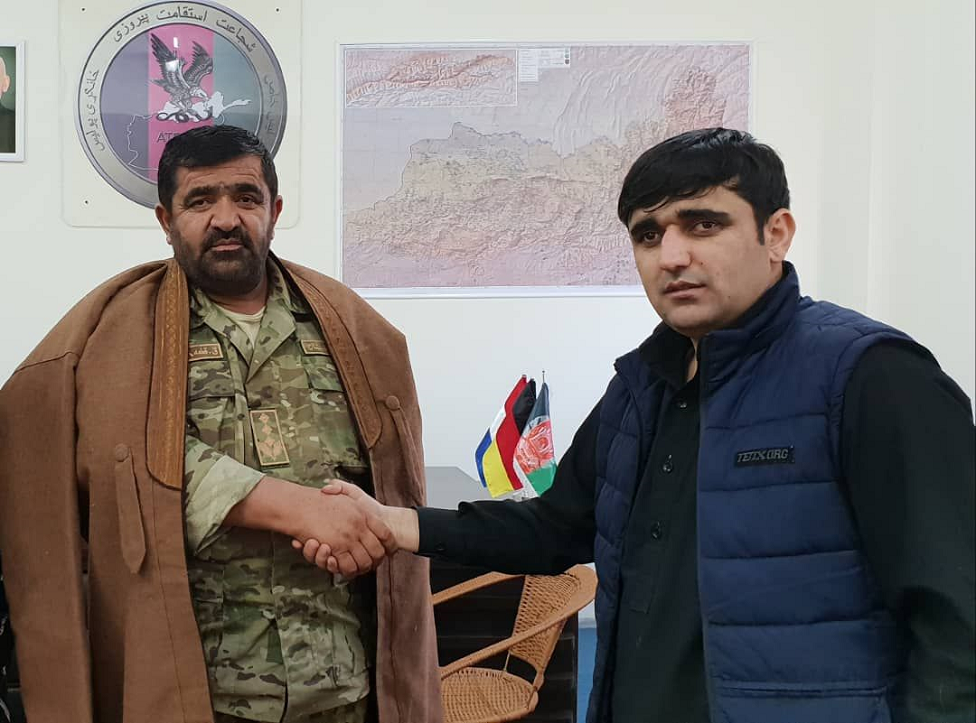
Colonel Abdullah Gard with his son, Farid Ahmad Gard
Later on Wednesday, as night fell, Afghan Air Force jets were dispatched to exact revenge for the Taliban attack. They launched an air strike against a mosque in the same province, where in an adjacent religious school young boys were studying the Koran.
Twelve boys were killed and 18 more wounded, along with their teacher, Abdul Wali.
At a local hospital, one father, Abdul Razaq, told the BBC his two children were at the religious school when the strike hit.
"One of my children was killed and is still at the scene of the air strike," he said. "I brought the wounded child here. I left my dead child on the ground to save the wounded one."
In Afghanistan, violence takes its toll one way or another. The conflict has driven many civilians from their home towns, and even their country, to find refuge, work or medical care.
That same day, in another part of the country - Nangarhar province in the east - at least 15 civilians including 11 women were killed in a stampede as people queued for visa applications in the city of Jalalabad.
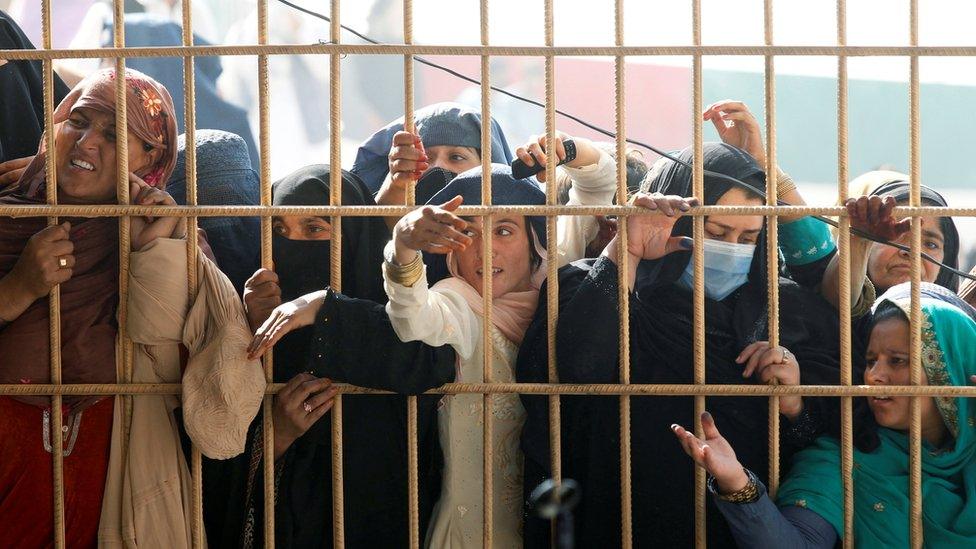
Afghan women wait for a token to apply for a Pakistan visa. At least 15 people died in a stampede
Early that morning, 60-year-old Niaz Mohammad returned home after his nightshift and the first thing he noticed was the absence of his wife, who had left home at 2am to secure a good spot in the queue at the Pakistani consulate.
The first call Niaz Mohammad received said his 55-year-old wife, Bibi Ziwar had been hit by a car. He went straight to the hospital but they redirected him to the morgue, where he found her dead body. She had been crushed in the stampede.
Bibi Ziwar was a mother to eight sons and three daughters. Some of them lived in Peshawar, across the border in Pakistan.
"She was missing her grandchildren," Niaz Mohammad told the BBC. "They couldn't come to her, and she couldn't stand this distance any longer."
Thursday 22 October
In Badghis in the north-west, two brothers were killed by a roadside bomb. Local officials in the nearby city of Herat said the bomb had been planted by insurgents on a highway used by the military, but the two young victims were civilians. One was a university student.
In northern Faryab province, at least four people were killed and 14 others wounded in what local officials said was a rocket attack by the Taliban.
Friday 23 October
At least 20 soldiers were killed in a Taliban attack in Nimruz province in the south-west. Local officials said that many others were wounded and six soldiers were taken hostage.
Images were shared on social media showing the soldiers' corpses strewn in the desert, as well as images of the hostages, who appeared to be injured.
Saturday 24 October
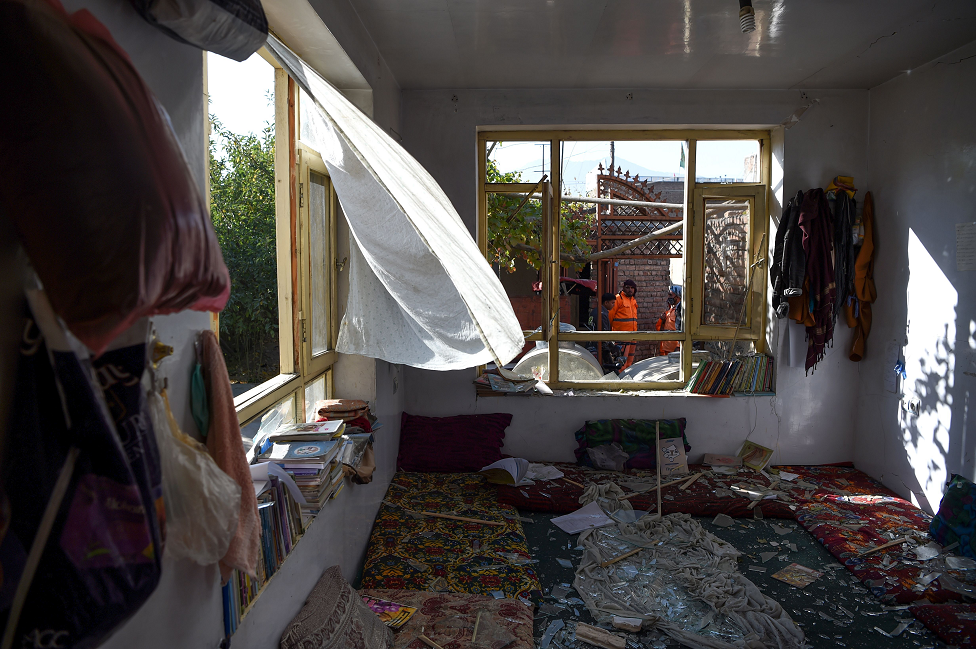
Bomb damage at the Kawsar-e Danish tuition, where teenagers were targeted
As many as 600 students were at the Kawsar-e Danish tuition centre in the capital where Latif Sarwari lost his life in the suicide attack. The majority were from the Shia Hazara community, who Sunni extremists consider heretics, and there are growing concerns that these attacks are provocations intended to start a religious war. Most of the 25 victims of the bombing, like Latif, were teenagers. About 60 people were wounded.
Tabish, 17, was among the survivors. He had left in a hurry to get to football practice and his long strides away from the school took him far enough to save his life.
"I was still at the end of the lane when the explosion happened. My very close friend, Mirwais Karimi - a very intelligent student - was killed. He sat next to me in the class and I can't believe he is not with us any more," Tabish said.
Who carried out the attack is unclear. The Taliban denied involvement, while Islamic State militants claimed responsibility. But to the civilians wounded and the loved ones of those who were killed the end result is the same.
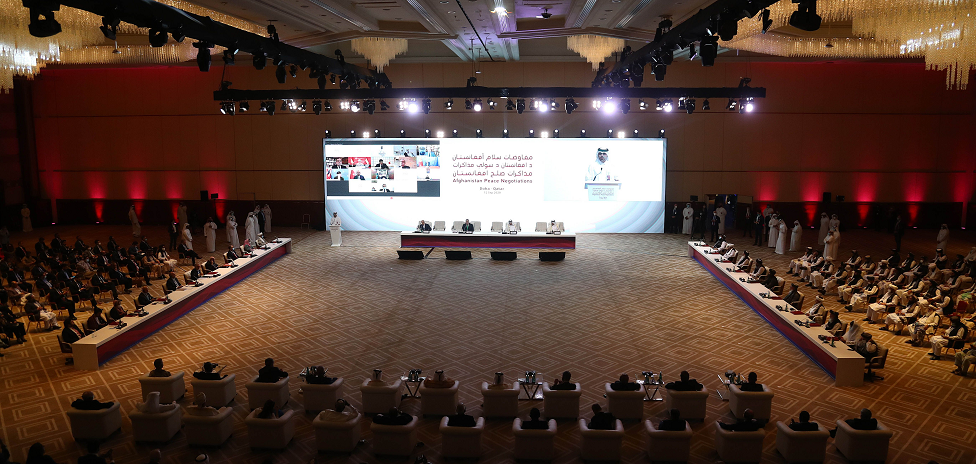
Peace talks between the Afghan government and the Taliban are underway in Qatar
The trail of violence through Afghanistan is long. Last week alone, people died in violence in more than 20 provinces. The numbers of civilian and government casualties are difficult to confirm. Taliban losses are even harder to establish.
The UN mission in Afghanistan has documented 2,117 civilian deaths in the first nine months of 2020 and 3,822 more wounded. The violence is getting worse, even though the government and the Taliban have spent a number of weeks negotiating.
"After a week of horrific violence across Afghanistan, this news drains every last ounce of energy and hope," tweeted Shaharzad Akbar, the chairwoman of Afghanistan's Independent Human Rights Commission, in response to last week. "How much more can we endure, as individuals and as society?"
Tabish, who ran from the Kawsar-e Danish tuition centre for football practice but heard his friends die behind him, was taken to hospital to remove shrapnel from his legs. He was one of the survivors last week.
"I found my son alive, lying on a bed," his father Fraidon said at the hospital. He was struggling to comprehend that the bomber had targeted students.
"They just want to study, as is advised by God and his prophet," he said. "I don't understand why they are being killed."
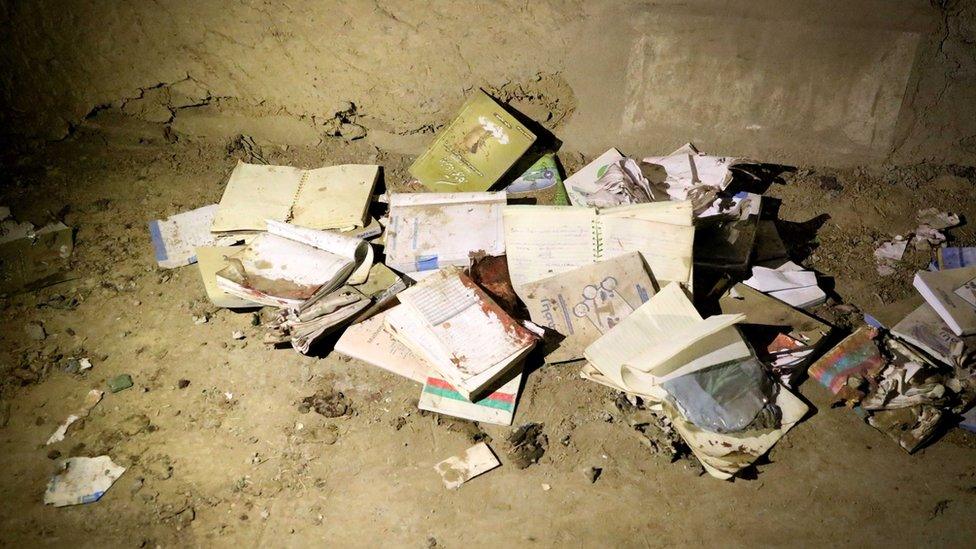
Bloodstained books at the site of the Kawsar-e Danish tuition centre bombing
Hafizullah Maroof, Bashir Paiman and Zuhal Ahad contributed to this piece.
- Published20 October 2020
- Published16 October 2020
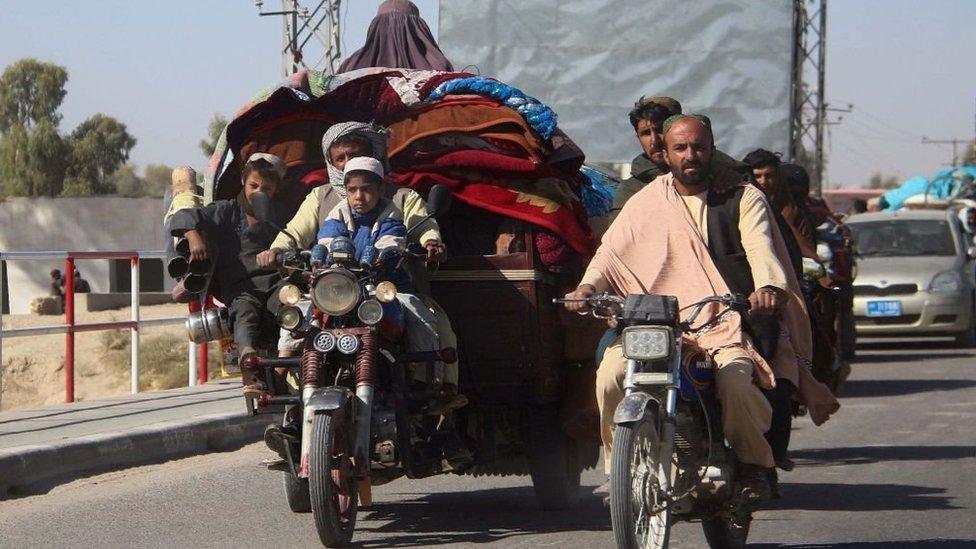
- Published22 October 2020
